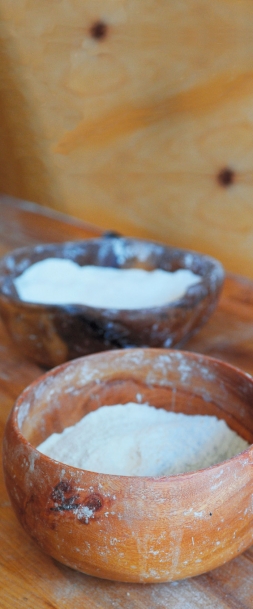Flour To The People!
Like anything that is born from your own hands, you only get what you put in. Because bread consists of just three basic ingredients—flour, water, yeast—the quality of those three ingredients make a world of difference in the final product.
Flour isn’t something that you would normally think of buying locally, like tomatoes or maple syrup, but maybe it’s time you should. Vermont flour is a key ingredient to hearty families, healthy farms, and happy taste buds.
There are many benefits to using flour that is grown by your neighbors, including a wonderful variety of textures, a sweet nutty flavor and a flour with no added ingredients. Patrick Giantonio, a baker for 16 years and owner of Green Mountain Twisters, exclusively uses local flour to make his amazing pretzels.
“I have never found a flour as wonderful to work with as Nitty Gritty Grain’s. It’s very special to be able to work with local, Vermont-grown flour. This makes me much more aware about the growing season and the effects on the wheat crop, which builds more of a personal connection with Nitty Gritty Grain, the wheat and their wonderful flour.”
To bake with local product, one must above all know thy flour. Matching the right flour to the right recipe often comes down to protein. Wheat protein, or gluten, takes shape as elastic strands in a well-kneaded dough and adds a wonderful chewiness in a finished loaf of bread. High-protein flours (12%–14%) are better for making fluffy breads and baked goods, whereas low-protein flours (8%–9%) are better for tender pastries like piecrusts and biscuits.
Whole-wheat flour will produce a denser bread because it still contains the rough bran, which will tear the strands of gluten, popping those bubbles before the bread is baked. This explains the airiness of white bread, and why you seldom find a 100% whole-wheat loaf that can make a successful sandwich. You may consider sticking to half whole-wheat if you would like a fluffy yet hearty sandwich bread.
Finally, because you may not always know what to expect from a new flour, keep an eye on your dough as you mix, adding liquids slowly to make sure the dough is neither too dry nor too wet. Different kinds of flour may respond differently to the same recipe, even if both are labeled “all-purpose.”
Where to find local grains?
Check your local co-op or natural foods stores for the names of some of these dedicated Vermont farmers. Be sure to request local flours if you don’t see them available, since many stores will be happy to stock what you’re looking for! Buying the flour in the bulk section is usually the most cost-effective way, for both you and the farmer. Look for stores with a well-stocked bulk section, or go to VTFoodAtlas.com to find suppliers of all things local.
Gleason Grains has been run by the Gleason family for more than 30 years and continues to supply stone-milled organic flour to bakeries and co-ops around Vermont, specializing in healthy whole-wheat.
Green Mountain Flour is devoted to bringing back “the story of bread” as a link to our local community and culture. They grow and stone-mill seven different grains into four kinds of flour each. Products and recipes can be found on their website at GreenMountainFlour.com.
Nitty Gritty Grain Co. of Vermont is another organic powerhouse devoted to sustainable farming and consumption practices. They began growing wheat at the request of Randy George of Red Hen Bakery and have been going strong ever since. They offer products in compostable packaging through their website (NittyGrittyGrain.com) as well as in numerous stores around New England.
West Meadow Farm Bakery has the gluten-free crowd covered, with all-purpose flour ready for purchase both online and in their Essex Junction shop, along with pre-made treats. You can visit them at WestMeadowFarmBakery.com.
Butterworks Farm is another longstanding institution which, in addition to fine dairy products, offers wheat berries, corn meal, and whole wheat flours in various Vermont co-ops. You can find out more at ButterworksFarm.com.





